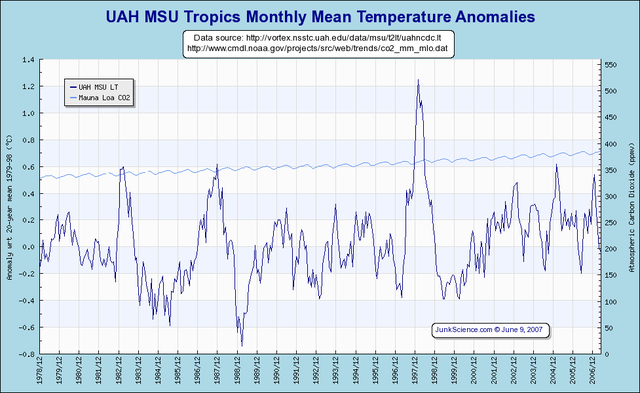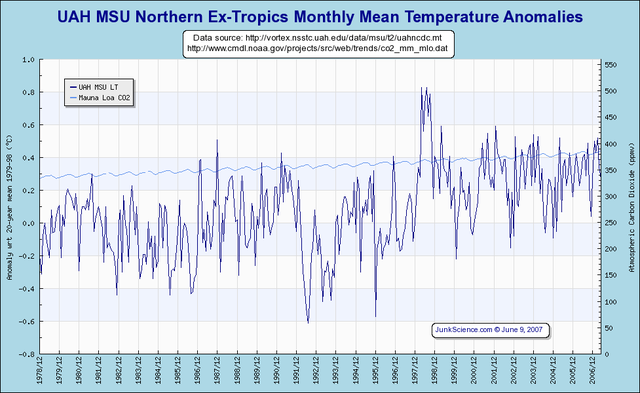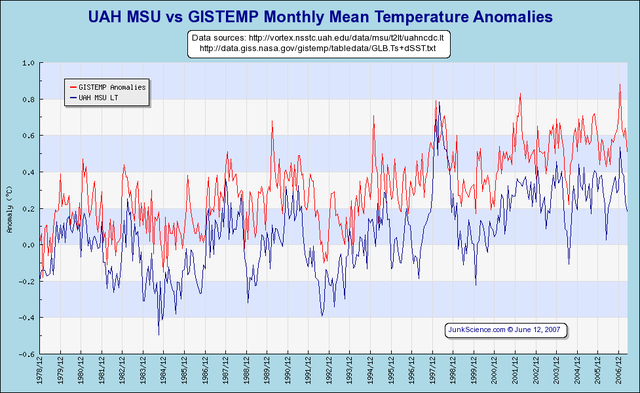The Big Lie
I try to never use "lie" or "liar" when discussing politics. They have become perhaps the most abused and overused words in political discourse, and seldom do they add much to a discussion.
But I simply have no other way to reconcile Obama's promise that he is not raising taxes on 98% of Americans with his imposition of a cap-and-trade system for CO2.
For years, Al Gore supported a carbon tax on fuels as a way to fight CO2. As I have written a number of times, if one really feels the need to reduce CO2 emissions (which I don't), then a carbon tax is far, far more efficient, fair, and effective than a cap-and-trade system. There are only two advantages to a cap-and-trade system over a carbon tax, and neither has anything to do with Co2 mitigation or program effectiveness:
- The tax is hidden, so politicians can pretend the did not really impose a tax. The author of California's AB32 cap-and-trade system admitted as much to me in a face-to-face debate we had last year
- There are numerous opportunities for politically favored companies to create dubious offset and measurement systems under cap-and-trade which don't exist under a more straight-forward carbon tax. Which may explain why Al Gore, who sits on the board of over $2 billion in investments in such companies peddling various offset quackery, now supports cap-and-trade over the carbon tax
Here is the basic economics, a topic on which it is rapidly becoming clear that Obama is completely ignorant**. First, we have to assume that whatever cap-and-trade system that is implemented is actually effective at reducing CO2 emissions. This is far from an absolute given, as it can be argued that the European system has done all of about nothing to reduce Co2 emissions (they will claim that it has been effective, but the majority of European CO2 emissions have come from a) British coal-replacement strategy, initiated for reasons other than Co2; b) fall of the inefficient Soviet economies and the shut down of their worst polluting industries; and c) unification of Germany.
But, assuming that cap-and-trade actually reduces CO2, then it HAS to increase costs for consumers. There is no way around it. It will do one or both of the following:
- Raise prices due to increased producer costs. An example is electricity generated from any sort of fossil fuel will simply have to be more expensive
- Raise prices due to increased scarcity. In industries where the supply and demand dynamics do not allow cost increases to be passed to consumers, then reduced production and scarcity will result. In the electrical industry, older coal plants that can't afford to pay for the Co2 permits may need to shut down.
Recognize that this HAS to occur, especially #2, or the cap-and-trade system won't be working. Another way to put it is 1 and 2 above are what designers of the system want and expect to occur.
So how is this not a tax? Well, this is an old, old strategy. Rather than tax consumers directly, the government taxes business. When companies inevitably pass the cost on, it is not the government at fault, it is the business for being greedy and raising prices. Politicians insulate themselves from criticism.
Further, Obama and the environmental crowd have been laying the groundwork over this for years by arguing that such "green" initiatives actually help the economy and improve efficiency. They have no proof of this, but they repeat it A LOT. Repeat something enough, and some people believe it. This despite the fact that there is no way in the world that obsoleting perfectly good production capacity and requiring its replacement (e.g. coal plants) is a net positive for the economy. (It can be a net positive for human well-being, but to say it is net positive for the economy is to fall into the broken windows fallacy).
So expect that when power companies inevitably raise prices due to cap-and-trade, politicians will respond by saying that the companies are being greedy and simple minded, and if they were really smart, the cap-and-trade system would not have cost them anything. It would have made them more efficient. it would have been a net positive. And that this failure of theirs to see this probably will drive calls on the left for more government oversight and regulation of these industries.
Don't believe me? Think this last paragraph is exaggerated? Well, here are two things to think about. The first is from our former Arizona governor, arguing that she got a bunch of government employees into a bull session in a conference room for an hour or so, and they all decided that cap-and-trade would be a net benefit to the power industry:
Napolitano brushed aside questions of what effect the plan will have on utility rates.
"First of all, that it may increase electric bills doesn't mean it will increase them now," Napolitano said...
Napolitano said there is "lots of data" to suggest that utilities eventually will be able to save money "by moving to a system of "˜green' energy.""¦
on a long-term basis, there may be cost savings.
So if utilities raise their rates, its obviously because they are greedy profiteers, because all of us here in government think it's obvious that paying for carbon allowances should result in cost savings. If it doesn't, well, maybe we are smarter than they are, and have to provide more government leadership of the industry.
They would never go that far, you say? So why has Obama created a government commission to restructure the auto industry on the implicit assumption that a couple of smart government guys in a room can do what the industry itself has not been able to do for 30 years?
** This is not to say that Obama does not have highly educated economic ad visors. But the President's own knowledge, assumptions, comfort-level and outlook on a subject are critical, no matter what the quality of his advisers. For example, even if I were crazy enough to want the job, I would never run for President because I know, by outlook and knowledge, I am not qualified to manage foreign policy or be commander-in-chief of the military. Sure, I could surround myself with advisers, but there are proven limits to the "rely on advisers" approach. I might argue that Bush's foreign policy is an example of such limits.


